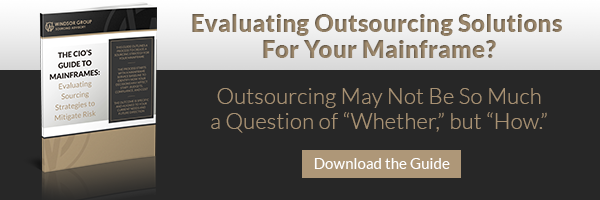.jpg) The corporate imperative to do more with less permeates every aspect of your planning and decision-making. Mainframe outsourcing can help you creatively and strategically address that challenge, but if you don’t approach outsourcing carefully, you could wind up spending more and getting less than expected.
The corporate imperative to do more with less permeates every aspect of your planning and decision-making. Mainframe outsourcing can help you creatively and strategically address that challenge, but if you don’t approach outsourcing carefully, you could wind up spending more and getting less than expected.
That’s no bargain. Worse, it sets you up for frustration and inefficiencies that could stymie your efforts to remain competitive and grow your enterprise. You can easily avoid these four common pitfalls by being aware of them in advance as you consider your mainframe outsourcing plans:
1. Not accurately calculating total cost of ownership before making critical decisions.
Comparing apples to oranges isn’t useful. If your business case doesn’t take into account every detail pertinent to your current mainframe situation, you can’t accurately compare it to potential alternatives or compare alternative solutions to one another.
Total cost of ownership includes obvious operations and capital costs, but also operations expenses housed on other lines within your budget. You must also include indirect costs such as depreciation, early termination fees for any existing contracts, etc. Add it all up – over the same number of years you might expect an outsourcing contract to run.
2. Not exploring all the mainframe outsourcing options available.
This easily leads to choosing the wrong solution. You could wind up outsourcing too much, or too little, or simply the wrong aspects of your mainframe operations. It’s tough to stay abreast of the marketplace because it continues to evolve, but these days virtually anything is possible. You can devise a hybrid solution uniquely fitted to your corporate goals and personality as well as your budget.
The right solution can help you reduce personnel expenses while expanding your access to the latest IT expertise, eliminate overhead and management costs while giving you the flexibility to address data growth challenges. Services are scalable, so your agility is never compromised.
3. Choosing the wrong supplier.
Successful mainframe outsourcing depends on more than advantageous pricing. The vast majority of deals fail because the personal relationships are a poor fit. Unlike hiring a janitorial service or some other discrete contractor, your outsourced team becomes part of your corporate team, working to support enterprise growth. But you can’t benefit from their broader, up-to-the-minute industry knowledge, specialized skill or insight if you can’t get along or you’re working at cross-purposes.
4. Assuming things will unfold just as you expect, without any financial or managerial oversight on your part.
Offloading tasks and management of certain day-to-day operations doesn’t relieve you of overall responsibility to ensure your company is getting the performance you need at the price you agreed upon. KPIs and benchmarks – whatever metrics you use to regularly analyze overall business performance – all apply to mainframe outsourcing, too. If you’re the CIO, or the CFO or the CEO, you can’t afford to relinquish ultimate control.
You can’t afford to inadvertently lose control, either. Mistakes happen, whether simple accounting errors or more insidious problems. Regular communication and careful monitoring head off potential problems and enable early detection, so you and your provider can work together to plug holes or correct course.
Without having all the right mainframe outsourcing elements in place, you can’t get back to concentrating on your organization’s mission-critical work. And even though outsourcing can help optimize costs and increase productivity, it’s that core focus that will take your company to the next level.
You can avoid most of these mistakes by conducting a thorough internal assessment before making any outsourcing decisions. Negotiating a detailed, comprehensive contract will help guard against other costly mistakes. Working with an appropriately-experienced mainframe outsourcing consultant can ensure you uncover every opportunity and also every potential hidden cost. And they can help you plan a transition and ongoing oversight to ensure you get maximum ROI, right from the start of your mainframe outsourcing experience.


